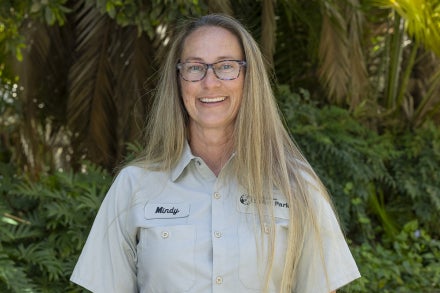
Several members of the San Diego Zoo’s new African penguin colony have arrived and are currently undergoing initial veterinary exams, in preparation for their debut at the Zoo’s soon-to-open Conrad Prebys Africa Rocks. These 15 penguins, from the Minnesota Zoo and Toledo Zoo, are contributing to the San Diego Zoo’s newly expanded breeding colony, to maintain genetic diversity and create a sustainable assurance population for this endangered species.
Upon arrival at the San Diego Zoo’s Jennings Center for Zoological Medicine, all of the birds receive a visual health check to ensure there are no issues. The birds are also weighed and their body measurements are documented. Comprehensive individual exams then take place, while the penguins are under anesthesia. Veterinarians perform routine health checks that include a physical exam, blood work and radiographs.
“Animals that come to the San Diego Zoo go through quarantine exams, to ensure they are all healthy and disease free before they are introduced to the habitat—and, in this case, the rest of the colony,” said Joop Kuhn, animal care manager, San Diego Zoo Bird Department. “Today was really great, because all of the new African penguins have a clean bill of health and will be ready for their new habitat after the quarantine period.
The new penguins will remain in quarantine for at least 30 days before they move into their new Africa Rocks habitat.
The colossal new Cape Fynbos penguin habitat in Africa Rocks will feature a cobble beach area, penguin nesting areas and rockwork that mimics the granite boulders found at Boulders Beach in South Africa. The 70-foot-long and 10-foot-wide habitat will also include a 200,000-gallon pool for the penguins that stretches 170 feet, with depths up to 13 feet.
The African penguin is listed as Endangered on the International Union for Conservation of Nature (IUCN) Red List of Threatened Species. Once one of southern Africa’s most abundant seabirds, the species has suffered a massive population decline—from an estimated 1 million breeding pairs to only 23,000 breeding pairs in the past 28 years. Historically, penguin eggs and guano were commercially harvested, which had a devastating effect on the population. Although both practices were abolished toward the end of the 20th century, other threats—including a lack of readily available food due to overfishing, climate change, oil and marine pollution, habitat degradation and predation by seals, sharks and land-based predators—continue to decrease their population.
San Diego Zoo Global participates in the Association of Zoos and Aquariums’ Species Survival Plan (SSP) program for these endangered aquatic birds and partners with the Southern African Foundation for the Conservation of Coastal Birds (SANCCOB), to help facilitate conservation programs in South Africa.




